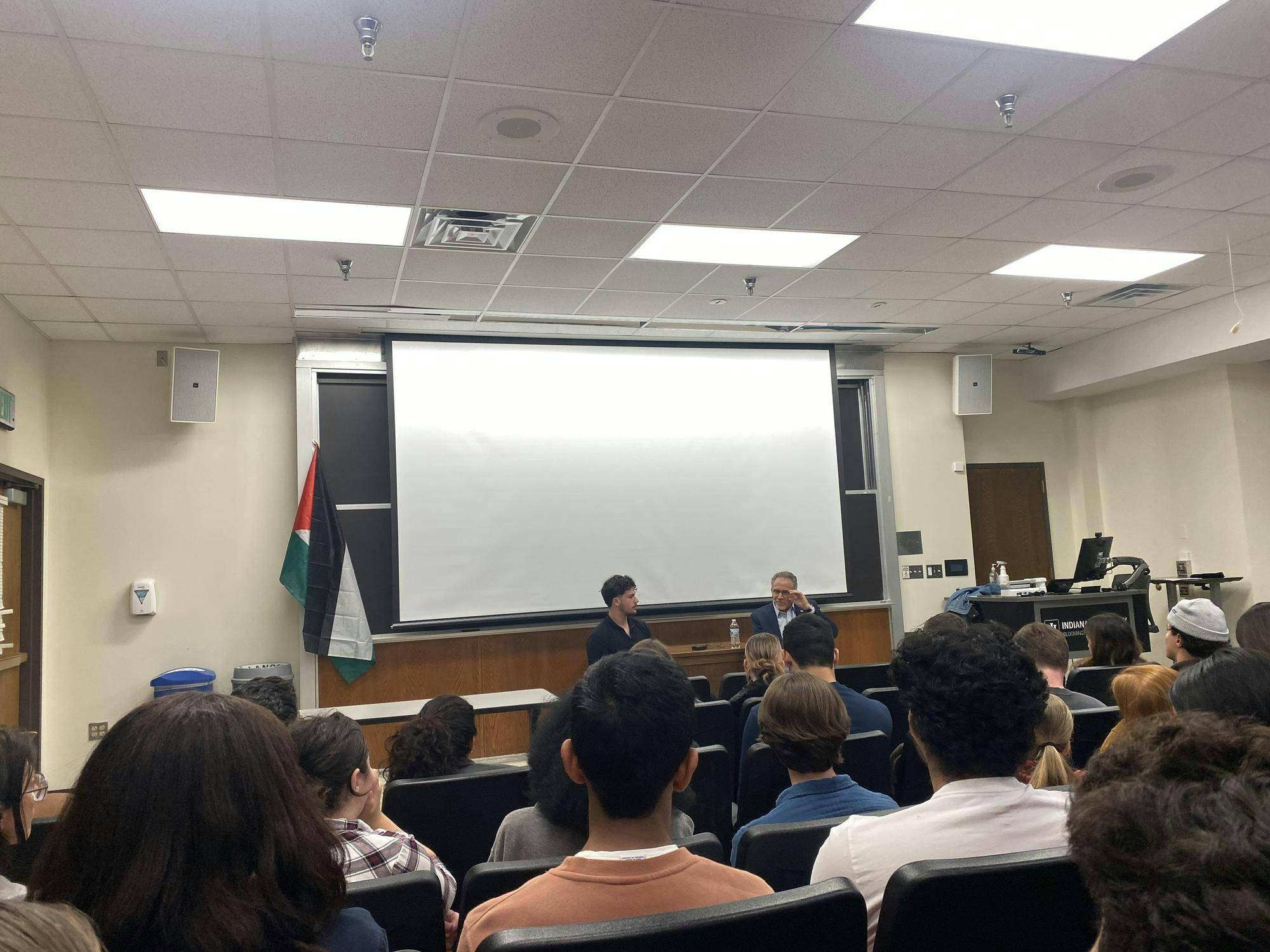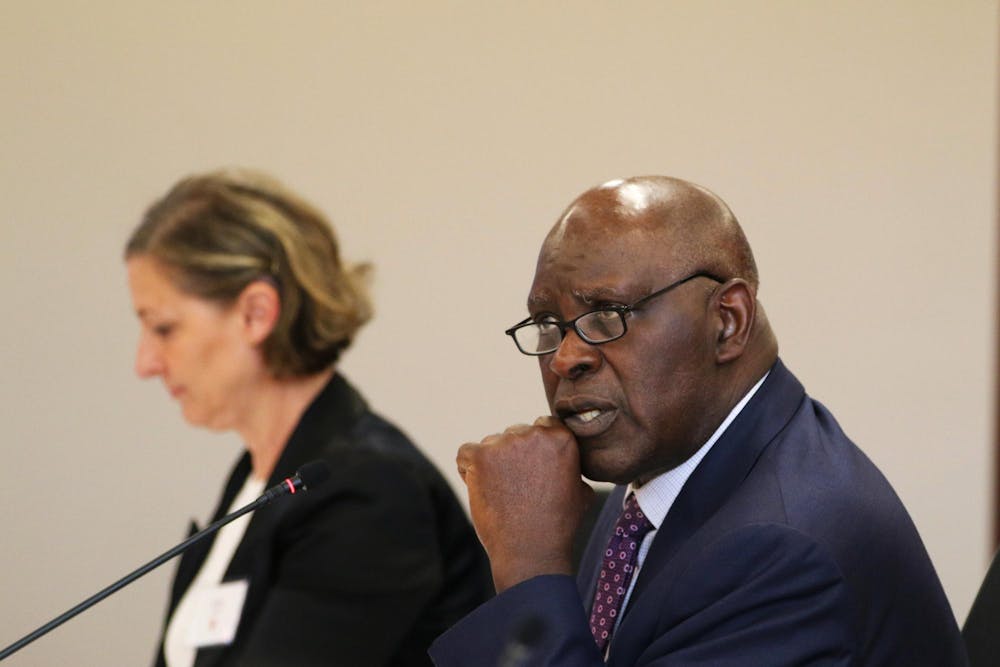The IU Board of Trustees approved revisions to ACA-33, the Academic Appointees Responsibility and Conduct Policy, during its meeting Monday. The board approved the changes unanimously.
The changes were first approved by the University Faculty Council in the spring, according to an IU press release.
Among other things, the revisions deal with campus-specific and university-wide faculty sanctions policies and faculty advisory boards. These topics came into focus after IUB professor Abdulkader Sinno was suspended by Vice Provost for Faculty and Academic Affairs Carrie Docherty in December.
Docherty did not follow IUB policy BL-ACA-D27 on faculty disciplinary procedures, according to IUB's Faculty Board of Review. She argued the university policy, ACA-33, which does not require an FMRC hearing, supersedes the Bloomington campus policy.
Under ACA-33, campus faculty governance organizations are permitted to have a policy including a faculty advisory body in the decision to impose severe sanctions. At the time of Sinno’s suspension, it didn’t include language requiring the campus-level advisory bodies to be included in the disciplinary procedures process.
Under BL-ACA-D27, IUB has a faculty advisory body — the Faculty Misconduct Review Committee.
According to the Bloomington policy, complaints levied against faculty are to be heard by the FMRC in a hearing where involved administrators and faculty present their case. The FMRC then makes a recommendation to the provost, though it is ultimately the provost’s decision.
Now, once the IUB campus policy is updated to align with the ACA-33 revisions, the FMRC process will be required. Until then, the university-wide policy will supersede the campus one.
Sinno, following the meeting, called the revisions “a good move forward.”
Here is an overview of the updated policy and the context behind the changes.
What are the revisions?
Although much of the nearly hour-long trustees meeting was devoted to the new expressive activity policy, it began with a presentation of the ACA-33 changes by UFC co-chair Danielle DeSawal and IUB Provost and Executive Vice President Rahul Shrivastav.
The updated policy includes explanations of what common and severe sanctions mean and what factors may lead to a severe sanction. A common sanction is intended as “proportional” and “corrective” responses to “discrete” policy violations. A severe sanction “significantly alters the terms and conditions of a respondent’s employment” or impacts their ability to conduct forms of work inherent to their position.
It also adds that respondents must be notified in writing that a “finding of fact has been made” and they are facing a sanction. The notice must also clarify whether the sanction is intended to be common or severe.
While ACA-33 applies to all IU campuses, individual campuses can have their own faculty disciplinary procedure policy. At IUB, it’s BL-ACA-D27. However, the previous version of ACA-33 did not state the campus-specific policies had to be part of the sanctions process.
Now, at IU campuses with campus-specific policies that include a faculty advisory body in the decision to impose severe sanctions, the campus-specific policy is required to take effect when an appointee receives a severe sanction. However, DeSawal said the campuses will need to update the language of their policies to align with ACA-33 first. Until then, she said, ACA-33 will supersede the campus-specific policies.
She said the UFC will continue to have conversations about whether the campus-level policies or a single, university-wide one is necessary.
“I would expect that there’ll be changes to it on at least an annual, if not, a biannual basis,” DeSawal said.
The changes also included updated language on employee relationships involving students, among other wording alterations.
DeSawal said she, along with her UFC co-chairs, believes the communication between faculty and the administration about the revisions was a good example of shared governance working. UFC co-chairs previously criticized shared governance between the council and board during its last public meeting in June.
Shrivastav called the changes a “significant improvement” on the university-wide policy, although there continues to be “work to be done” on the campus-level policies.
After the meeting, Sinno said the changes make it so ACA-33 can’t be interpreted to mean campus-specific protections do not apply.
“The way the administration tried to take away my rights as a faculty member, to have a committee of my peers to assess whether I’m guilty of what they’re accusing me of, is that they pretended that the local policy does not apply,” Sinno said.
He said he hopes it will prevent cases like his from happening again going forward.
“So hopefully, future professors who will be attacked by this administration, by the Whitten administration, and by Rahul Shrivastav, will have those protections after the local policy’s amended so it could work with A33,” Sinno said.
Context of the changes

Sinno, an IU political science and Middle Eastern studies associate professor, acted as the IU Palestine Solidarity Committee’s advisor. When the group invited Miko Peled, an Israeli-American activist supportive of the Boycott, Divestment and Sanctions movement, to an event Nov. 16, Sinno requested a room reservation 10 days in advance. It was approved a few hours after he submitted the request.
Eight days later, Sinno was informed by Asaad Alsaleh, chair of the Middle Eastern Languages and Cultures Department, he had made a mistake on the form. When Sinno listed MELC as his department on the request, it had given the false impression it was a department-sanctioned event. Sinno said it was an honest mistake and that he assumed the “Department” field simply meant he needed to specify his department.
Sinno canceled the request, and the PSC then requested the space. On Nov. 15, one day before the event, the request was denied due to the short notice of the request and IU’s determination it needed security measures. Mary Waggoner, event services coordinator for Space Reservations at IU, wrote in an email to the PSC that they could host the event, just not the day they had requested.
Nevertheless, the PSC, whose president said had already paid for Peled’s expenses to come to IU, held the event anyway. The PSC president also alleged the cancellation was due to the content of the event, as a PSC vigil Oct. 9 received same-day security measures.
Before the event Nov. 16, Nick Cullather, interim dean of the Hamilton Lugar School of Global and International Studies, sent a notice of “conduct violation” to Sinno. He referenced ACA-33, which prohibits “forgery or unauthorized alteration of university documents, records, or databases, or knowingly submitting false information for an official university purpose.” Cullather wrote further misconduct could lead to a conduct investigation, which may result in an official sanction.
That sanction came about a month later, when Docherty sent Sinno a letter Dec. 15 informing him he had violated ACA-33, in addition to IU’s Principles of Ethical Conduct policy and student organizations policy. For these violations, he received a suspension prohibiting him from teaching and advising graduate students during the spring and summer terms; preventing him from advising student organizations for one calendar year; and disallowing him from engaging in “any and all student-related activities.”
Docherty wrote Sinno had misrepresented the event as an academic talk on the form but told her in an interview it was for a student organization; chosen not to request security ahead of time; attended the event, despite it being unauthorized; and repeatedly said “I do not recall” during his interview, decreasing his credibility. Docherty also wrote of instances of “threatening” behavior toward a colleague and multiple bias incident reports against Sinno, but she did not list the individuals involved or content of the reports.
The move received criticism from IU faculty, including Sinno’s fellow political science professor, Jeffrey Isaac. Isaac urged Docherty to reconsider the sanctions and co-authored a letter in support of Sinno and academic freedom. It has over 400 signatures as of publication.
The suspension became associated with faculty and students’ other free speech and academic freedom concerns on campus, including the cancellation of Palestinian painter Samia Halaby’s exhibit and Senate Bill 202. It also influenced an April faculty vote of no confidence in IU President Pamela Whitten, Shrivastav and Docherty, with the motion of no confidence in Docherty passing with 75% of the vote.
Docherty’s decision to suspend Sinno under ACA-33, rather than first referring it to IUB’s Faculty Misconduct Review Committee, as campus policy dictates, led some faculty and the IU Faculty Board of Review to conclude Docherty violated IU policy. In a March 28 opinion obtained by the Indiana Daily Student, the FBR recommended Shrivastav direct Docherty to follow BL-ACA-D27 and refer the matter to the FMRC.
Docherty said at a Bloomington Faculty Council meeting Jan. 16 that only two of the nine faculty discipline cases in the last five years involving limited contact with students and reassigned teaching duties were referred to the review committee.
The FBR also concluded Docherty further violated the IUB policy during the board’s own review process by not providing Sinno with a dossier containing bias incidents reported against him, emails and letters detailing illustrating conflicts between him and faculty and administrators, and other incident reports involving Sinno.
Shrivastav’s response
In a May 13 letter from Shrivastav to the FBR obtained by the IDS, the provost writes he would not accept its March 28 request to direct Docherty to follow the Bloomington faculty disciplinary procedures policy.
“In my view, the VPFAA made the correct determination in following ACA-33 and prior precedent in this case,” Shrivastav wrote. “Therefore, I am not accepting your recommendation to utilize BL-ACA-D27 and find no actionable grievance with the VPFAA in this case.”
Instead, he recommended the board review Sinno’s challenge to Docherty’s sanctions to determine if they were appropriate. Under BL-ACA-D22, the board has the responsibility to hear grievances from academic appointees against administrative action and make recommendations. The policy also states university officials may not “interfere with, seek to influence, or advise it to halt its proceedings except as provided in this policy.”
Shrivastav agreed Sinno should be provided with the dossier as part of his appeals process and said he asked Docherty to provide a copy to him.
However, he pushed back against the interpretation from the board, as well as “numerous media reports,” of comments he made at the Jan. 16 BFC meeting to mean he would refer the case to IUB’s Faculty Misconduct Review Committee.
“I’m committing here today that I will act on their recommendation as appropriate,” he said at the meeting, in reference to the FBR.
In the May 13 letter, he said he was not referencing a specific case when making that comment at the January BFC meeting, as personnel matters are confidential, and noted his comments would apply “as appropriate” based on the facts of the case.
Now the revisions to ACA-33 have taken effect, once BL-ACA-D27, IUB’s faculty disciplinary procedures policy, is updated to align with it, future cases of severe sanctions against faculty will require the review committee’s involvement. For the time being, ACA-33 will supersede the campus-specific policy.




